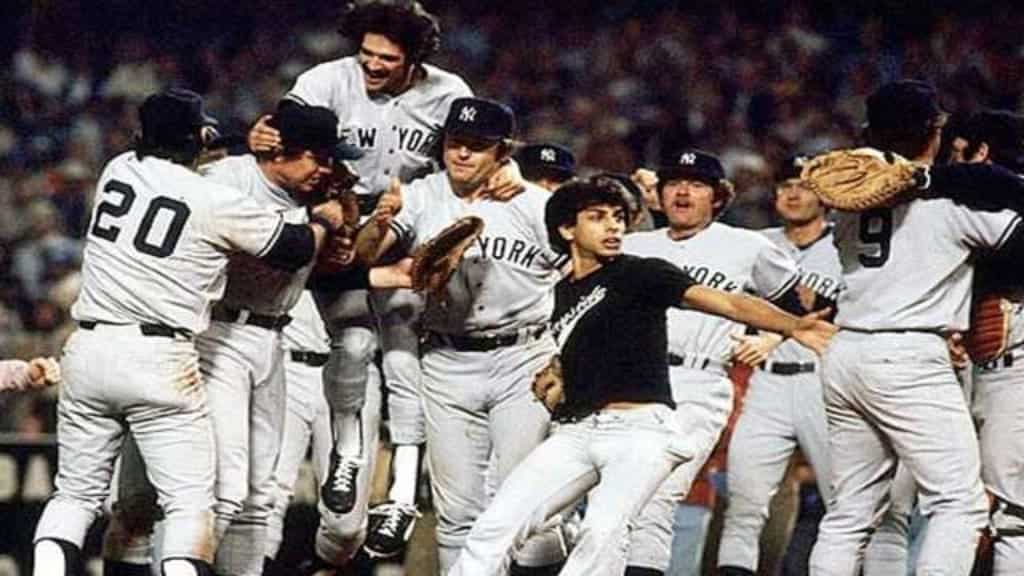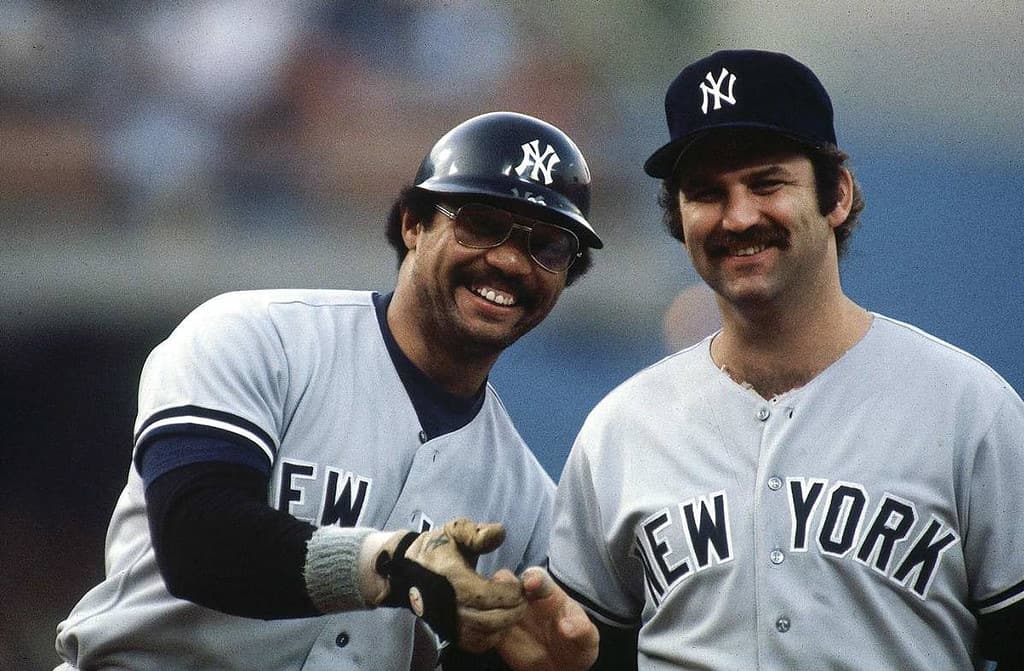The Comeback Kings: Reliving the historic 1978 New York Yankees season

Josh Barrett
More Stories By Josh Barrett
- Mother’s Day: How Anthony Volpe’s mom molded him into a Yankee phenom
- 470-Foot Bomb: Aaron Judge sets career record despite Yankees’ loss to Red Sox
- Giancarlo Stanton to rejoin Yankees for Phillies series opener on Monday
- Yankees’ prospect Jasson Dominguez hits 1-for-4 in Triple-A comeback
- Rich Hill draws Yankees’ attention for midseason signing
- May 26, 2023
- 1:24 pm
- One Comment
Table of Contents
Few baseball seasons can match the 1978 New York Yankees season for drama and excitement. The Yankees displayed resilience, teamwork, and sheer grit as they overcame an early season disadvantage. They battled through internal issues and mounted their greatest comeback to overcome a 14-game deficit to win the division, the pennant, and their 22nd World Series championship. Let’s rewind to 1978 and see what it took for the Yankees to achieve their greatest-ever comeback in baseball history.
1978 New York Yankees season began on a rough note
The New York Yankees entered the 1978 season as World Series champions from the previous year. But the Bronx Bombers faced a formidable test in the season’s first weeks and had a rough start that seemed to push them away with an unbridgeable gap.
The team had a hard time finding offensive consistency in the first few months, which threw away the start to the 1978 New York Yankees season into disarray. During slumps, hitters were unable to produce a steady stream of hits and runs. The offense was unable to create momentum and score runs in bunches due to inconsistent play from key players. The 1978 April Yankees averaged 3.86 runs per game, scoring 85 runs in 22 games. For the month, as a team, they hit .250.
The Yankees’ power hitters, led by Reggie Jackson, struggled to reach their customary levels of production early in the season. Even offensively-minded players like Chris Chambliss and Roy White struggled to find their groove at this time. Their ability to produce runs in a timely fashion suffered as a direct result of this dearth of home runs and extra-base hits.
The Yankees also struggled in large part because their pitching staff wasn’t very good. The losing streak early in the 1978 New York Yankees season could be directly attributed to the inconsistency of their rotation. The team’s ERA was higher than intended, as key pitchers like Ed Figueroa and Catfish Hunter had rough outings.
Star power was not enough until June
The offensive problems of the squad continued in May of 1978, when they scored 106 runs in 28 games, or 3.79 runs per game on average. For the month, the team hit.248 as a whole. Although they had seen some offensive improvement in June 1978, the Yankees continued to struggle. In 29 games, they scored 118 runs, good for 4.07 runs per game on average. The monthly team batting average rose to .261.
Reggie Jackson, who had a sluggish start to the season due to his injury problems, hit.222 with three home runs and twelve RBIs in April. He saw modest gains in May, hitting .267 with three home runs and 14 RBIs dashing hopes for a big boost to the 1978 New York Yankees season.
Thurman Munson, who was also hampered by injuries, hit .263, .244, and .272 in April, May, and June, respectively. Also plagued by injuries, Mickey Rivers managed only .263 in April, .267 in May, and .254 in June.
Injuries, discord derailed 1978 New York Yankees season
As the offense struggled early on, especially in the months of April, May, and June, the 1978 New York Yankees season had to confront chaos and uncertainty. Reggie Jackson, a major contributor to their World Series victory the year before, struggled with ailments that reduced his playing time and diminished his effectiveness. Both Thurman Munson and Mickey Rivers, vital members of the lineup, had injuries that limited their production at the plate. The team’s offensive production suffered as a result of the lineup instability caused by these injuries.
Discord and animosity within the Yankees’ locker room only made things worse on the field. Several players, most notably Reggie Jackson, had tense relationships with manager Billy Martin. The discord that ensued from their personalities clashing and their divergent perspectives on team dynamics threatened to wreck the 1978 New York Yankees season.

Overall, the 1978 New York Yankees season was marred by pitching problems, significant player injuries, and internal strife. When matched up against their bitter rivals from Boston, the Yankees struggled mightily. The Red Sox build a 14-game lead over them by mid-July. The Yankees had an uphill climb to close the gap and recoup a competitive standing.
1978 New York Yankees season turnaround
The Yankees’ resurgence with confidence and morale may be traced back to the “Boston Massacre” series in July, in which they swept the Red Sox. The club made some adjustments, the players got back into form, and the offense started clicking saving the 1978 New York Yankees season. Leading to better performance and eventually the division title and the World Series victory.
The inconsistent performance of the Yankees’ pitching staff was one of the key causes of their early difficulties. The pitchers, though, started to develop their form as the season went on. Particularly on the mound, Ron Guidry established himself as a formidable force and had an outstanding season. The team’s prospects of winning were increased by Guidry’s outstanding performances and the better outings of other pitchers like Ed Figueroa and Mike Torrez.
Billy Martin changed the starting lineup when it was required and made vital choices at pivotal stages of the game despite internal disagreements and tensions among the team. The comeback during the 1978 New York Yankees season was aided by his ability to inspire the players and keep them focused on the end result of the victory.

The team’s internal tensions subsided as the 1978 New York Yankees season went on. And the players eventually put their disagreements aside to focus on the task at hand: winning. The team’s victory was due in large part to the players’ resiliency and resolve to overcome obstacles and triumph as a unit.
Yankees’ offense got back to life
In 1978, the Yankees’ offense played a crucial role in the team’s comeback and eventual success. The team’s batting average improved as the season went on, and it was the difference in the end. The Yankees’ offensive revival was largely due to the efforts of several key individuals. The team’s captain and All-Star catcher, Thurman Munson, was a reliable presence. Munson had a batting average of.297, 14 home runs, and 100 RBIs for the 1978 New York Yankees season. He was a regular clutch hitter.
Jackson earned the nickname “Mr. October” for his outstanding performance in the playoffs. He finished with a.274 average, 27 home runs, and 97 RBIs in the regular season. Chris Chambliss, the Yankees’ first baseman, was also instrumental in the team’s offense. He was a reliable source of runs batted in all season long, contributing to his team’s .277 batting average, 17 home runs, and 96 RBI total. Throughout the season, Chambliss was a major contributor thanks to his clutch hitting.
Mickey Rivers and Lou Piniella, both outfielders, also had significant offensive contributions. Rivers’ baserunning prowess and offensive spark at the top of the lineup were vital. While Piniella’s ability to produce clutch hits was on full display in the 1978 New York Yankees season.
The Yankees’ offense also received a boost from some unusual places. Although Bucky Dent was recognized mostly for his defensive abilities, he came through with several important hits, none more so than his three-run home run in the decisive game against the Red Sox.
The offensive revival led to 735 runs, which was the most in the American League, and their average was 4.53 runs per game. The key to their comeback and final victory was their ability to perform under pressure and convert on scoring opportunities when they arose.
Rivalry with Red Sox played a part
Another important factor in the Yankees’ recovery was their fierce rivalry with the Boston Red Sox. The head-to-head games between the two teams offered a chance for the Yankees to catch up to the Red Sox who had fallen well behind in the standings. The Yankees’ four-game “Boston Massacre” series victory over the Red Sox in July was a turning point that changed the tide in their favor. The victories over its competitors helped the club regain its confidence and belief while also reducing the rankings deficit in the 1978 New York Yankees season.

The “Boston Massacre”
The Boston Red Sox stepped in as the Yankees’ main adversary and a potential roadblock to their success. The Red Sox, propelled by the powerful tandem of Jim Rice and Carl Yastrzemski, jumped out to an early lead and never looked back, eventually stretching their advantage over the Yankees to 14 games by mid-July. The Yankees were under increasing scrutiny, and they needed a breakthrough to change their luck.
The four-game series in July 1978 between the Yankees and the Red Sox at Fenway Park became known as the “Boston Massacre” because of the decisive event that occurred there. In a series that came to be known as the “Boston Massacre,” the Yankees annihilated their opponents by a whopping score of 42 to 9. This amazing victory sparked renewed hope and momentum among the Yankees players, setting the groundwork for a historic comeback.
While the “Boston Massacre” sparked a spark for the 1978 New York Yankees season, it was outfielder Reggie Jackson’s comeback that really got things going. Jackson, who had a rough first half of the season due to injury and disagreements with manager Billy Martin, hit his stride in the second. His captivating personality and brilliant skills on the field inspired the group and gave them a shot in the arm.
The conflict gave into cohesiveness
The 1978 Yankees’ championship was a result of everyone’s hard work, not just Jackson’s. Thurman Munson, Graig Nettles, and Lou Piniella were all there for the team, and so were up-and-comers Ron Guidry, Goose Gossage, and Bucky Dent. The team’s incredible recovery was made possible by their willingness to set aside their differences and work together.

Playoff and World Series Glory
The Yankees and the Red Sox finished the regular season tied atop the American League East standings. As a result of this extraordinary situation, the division title was decided by a one-game playoff at Fenway Park. Bucky Dent, an unlikeliest of heroes, hit a three-run home run in a nail-biting game, lifting the Yankees to a 5-4 victory and ensuring their postseason berth.
The momentum in the 1978 New York Yankees season saw an upsurge from clinching their division and continued over into the playoffs, where it helped them win the American League pennant. They played the Los Angeles Dodgers, led by the great Sandy Koufax, in the World Series. The Yankees proved they were unstoppable by taking games six and seven of a marathon World Series to claim victory.
The indelible odyssey of the 1978 New York Yankees season serves as an unwavering homage to the supremacy woven by collective unity. It was remarkable for the team’s comeback aided by better pitching, offensive firepower, critical victory against the Red Sox, managerial tweaks, and cohesiveness. The fact that the 1978 New York Yankees were able to turn things around and win the division, the pennant, and the World Series is a credit to their resiliency, tenacity, and ability to overcome early adversity.
What do you think? Leave your comment below?
- Categories: 1978 New York Yankees
- Tags: 1978 New York Yankees
Related posts:



 Follow Us
Follow Us






One thought on “The Comeback Kings: Reliving the historic 1978 New York Yankees season”
Sandy Koufax retired in 1966. Someone did not do their research on an easy fact!